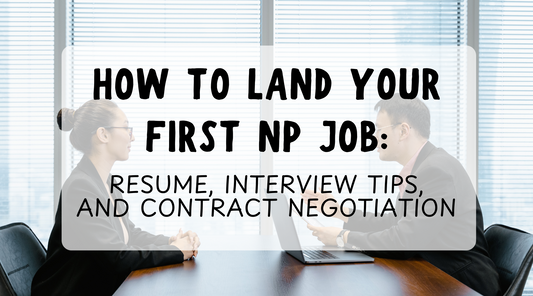Mastering Nurse Practitioner (NP) Salary Negotiations: A Step-by-Step Guide
Negotiating your Nurse Practitioner (NP) salary is an important part of ensuring that you are fairly compensated for your specialized skills and expertise. As a highly skilled healthcare professional, it’s essential to recognize your value and confidently advocate for appropriate pay.
Here are some key strategies to guide you through successful salary negotiations:
1. Research Salary Ranges: Empower Your Negotiation
Before engaging in any salary conversation, it’s critical to know what’s typical for your role and region. Research salary ranges for NPs in your area with similar qualifications and experience. Online resources like Salary.com, Payscale, and our NP Salary Survey provide useful data to inform your discussions. Knowledge is power—be prepared to negotiate from an informed position.
2. Highlight Your Value: Articulate Your Unique Contributions
When negotiating, emphasize the tangible value you bring to the organization. Articulate how your education, certifications, years of experience, and any specialized skills set you apart. Showcase your ability to improve patient outcomes and contribute to the overall success of the healthcare team.
Key points to highlight:
- Your clinical experience and expertise
- Relevant certifications or advanced training
- Proven ability to improve patient care and outcomes
3. Know Your Worth: Assess Market Demand
Understand the demand for Nurse Practitioners in your specific specialty and region. If you have a specialization or unique qualifications that are in high demand, you can use this as a negotiating tool to justify a higher salary.
Questions to ask yourself:
- What is the demand for my NP specialty in my area?
- Do I have unique qualifications that make me an asset to the team?
4. Consider Total Compensation: Look Beyond the Base Salary
While salary is important, it's only one part of your overall compensation package. Consider other benefits such as:
- Health insurance
- Retirement plans (401k, pensions, etc.)
- Paid time off (PTO) or vacation time
- Continuing education stipends or reimbursements
These perks can significantly impact the total value of your compensation, so make sure to negotiate these elements alongside your base salary.
5. Timing Is Key: Choose the Right Moment to Negotiate
Timing plays a crucial role in successful negotiations. Ideally, discuss salary expectations:
- During the final stages of the hiring process
- After a performance review or when you've exceeded job expectations
Be prepared to present a clear rationale for your desired compensation, backed by the data and evidence you’ve gathered.
6. Be Confident and Professional: Approach Negotiation with Poise
Confidence is essential when negotiating your salary. Approach the conversation with a positive attitude, maintaining professionalism throughout. Make your points clearly and assertively, but remain open to a collaborative and respectful dialogue.
7. Communicate Effectively: Articulate Your Value
Communicate your salary expectations in a clear, assertive manner. Provide evidence supporting your request—whether it’s your unique skill set, market research, or the organization’s needs. Listening to the employer’s perspective also shows your flexibility and openness to finding a solution.
8. Explore Non-Monetary Perks: Think Outside the Salary Box
If salary constraints prevent your desired pay, consider negotiating for non-monetary perks, such as:
- Flexible work hours or remote work options
- Additional vacation days or sick leave
- Opportunities for professional development
- A signing bonus or student loan repayment assistance
These benefits can improve your overall job satisfaction and quality of life without immediately impacting your base salary.
9. Be Prepared to Walk Away: Advocate for What You Deserve
While it’s important to be flexible, always be prepared to walk away if the compensation doesn’t align with your qualifications and market value. Advocate for yourself and seek out positions that truly reflect the value of your expertise.
10. Seek Professional Advice: Get Support When Needed
If you're uncertain or feeling uneasy about negotiating, consider seeking guidance from an experienced career coach, mentors, or colleagues. Having additional support can help you navigate tough conversations and achieve the outcome you deserve.
Remember: Salary Negotiations Are Standard Practice
Salary discussions are a normal and essential part of securing fair compensation for your professional skills and contributions. By approaching negotiations with confidence, conducting thorough research, and effectively communicating your value, you’ll increase your chances of landing the compensation package you deserve.
Don’t hesitate to leverage our New NP Guide E-book, which includes practical templates, scripts, and in-depth negotiation strategies to set you up for success.
Got Questions or Tips? Share Below!
If you have any other tips or questions about salary negotiations, drop them in the comments below! We’d love to hear how you approach the process.
Bonus Resources: Your Ultimate Guide to Success
If you're looking for a comprehensive resource to help you successfully transition into your NP career, check out our New NP Guide E-book. This guide is filled with essential advice, step-by-step strategies, and invaluable templates, making it the perfect companion as you embark on your career journey.
Introducing the E-book: "New NP Guide: Step by step advice and support for the transition from RN to NP"

To support you on your journey, we have created an e-book, This resource is 70 easy to read pages that are designed specifically for new grad NPs and covers essential topics such as:
- AANP vs ANCC
- Exam Reviews/ Study Tips
- Step by step instructions for getting credentialed with links to DEA registration pages, NPI application page, and other resources
- Resume Tips (Includes free editable NP resume template and cover letter)
- Interview Prep
- Job Offer Checklist
- Job Offer Red Flags
- Negotiating tips
- Finding a mentor
- NP Fellowships
- Useful NP resources
- Tracking CE hours
- Tackling Impostor Syndrome
- Self Care
- Malpractice Insurance
This e-book is a valuable companion that offers practical advice and insights to help you thrive in your first NP job. Whether you're just starting your search or have already secured a position, this guide will support you every step of the way.
Transitioning from a new grad NP to your first job is an exciting phase filled with opportunities for growth and development. Embrace the challenges, build your confidence, and approach the job search process strategically. Remember, every experience is a chance to learn and improve. And to further aid you on your journey, don't forget to check out our e-book here: New NP Guide



